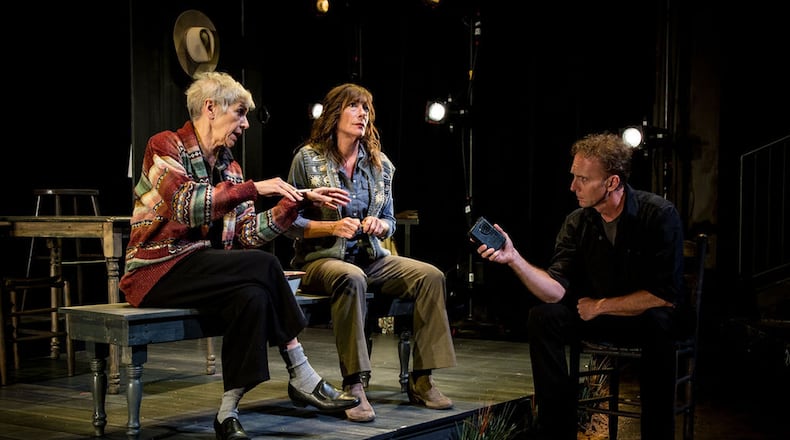This article has been updated to remove language that some readers found offensive.
In 1998, a 21-year-old University of Wyoming student was bludgeoned, tied to a fence post, and left to die in the snow — without his shoes. The two men who were later charged and convicted of his murder didn’t just steal his life; they also robbed him of his black, patent-leather shoes.
It didn’t take long for the openly gay, angelic-looking Matthew Shepard to become a martyr and a symbol of America’s revulsion with hate. In the aftermath of the tragedy, New York playwright Moisés Kaufman and members of his Tectonic Theater Project descended upon Laramie, Wyoming, to hold a mirror up to the town, as it reckoned and reeled.
Based on more than 200 interviews, the profoundly moving, highly influential fact-based play was first produced in Atlanta in 2001 by Actor's Express. Now Theatrical Outfit gives it another look, showcasing it alongside Thornton Wilder's "Our Town," with an identical team of actors and designers for both.
The results are breathtaking.
It is hard to imagine a more thoughtfully told, emotionally devastating “Laramie Project” than the one put together here by director Clifton Guterman, who confessed his personal affinity for Shepard during an opening-night curtain speech, and his 10 agile performers, who are required to portray as many as nine different real-life personalities in a single evening.
“Blessed Be The Ties That Bind,” the traditional hymn that comforts the people of Grover’s Corners in “Our Town,” shows up again in Laramie, along with a little Radiohead. (Bennett Walton designed the soundscape and composed original music for both shows.)
Stephanie Busing’s “Our Town” set is slightly modified to accommodate Laramie. Scene by scene, her textual projections help unify the structural elements of the play. This savvy shorthand also captures the snowy landscape of Wyoming; the headlines and news updates; the cherubic smile of the victim.
The windswept summit where Shepard was abandoned, where his tears turned to delicate crystals of frost, where he could see the twinkling beauty of Laramie down below, is not unlike the Grover’s Corners cemetery, where the dead are left to contemplate the world they left behind from a “windy hilltop.” In both productions, costume designer Sydney Roberts uses white fabric in meaningful ways.
MORE ON AJC.COM: Podcast: Everything you need to know about theater season in Atlanta
Since someone asked me recently who plays Shepard, it’s probably worth pointing out that he never appears onstage. Rather, he is evoked as a memory, by the limo driver he hired to take him to bars (the chauffeur is played by Allan Edwards); the bartender at the saloon where he went to drink on his final night (Shaun MacLean); his first responder (Stacy Melich); his good friend Romaine (Maggie Birgel); his father (Jayson Warner Smith); and so on.
The town of Laramie must process what it has wrought, and not everyone buys into the canonization of Shepard. Some subplots illuminate the ambiguities. A young actor (MacLean) shares how his parents did not support his playing a gay character in “Angels in America.” Reggie Fluty (the police officer who was first on the scene) and her mother, Marge Murray (the hilarious Mary Lynn Owen), recall their fear Fluty might have contracted the HIV virus from Shepard (who had tested positive), and the personal drama that followed.
Some townspeople, and family members of the accused, try to smear Shepard’s reputation. The various clergymen of Laramie must weigh in on their concerns, and a renegade, flag-waving fundamentalist minister (Edwards) comes to protest and spew hateful language. The way Shepard’s supporters shield the heckler from public view is classic.
Tectonic Theater Project's shoe-leather reporting techniques are well-suited to presenting opposing points of view, evincing a full, rich, clear-eyed portrait that is sympathetic without being overtly preachy and sentimental. (The ensemble's 2017 production of "The Temple Bombing" at the Alliance Theatre was also concerned with a famous hate crime, and the way it enveloped our town, Atlanta.)
After Orlando and Charleston, after Charlottesville and Pittsburgh and El Paso, “The Laramie Project” feels more essential than ever, and Theatrical Outfit’s telling is a necessary and welcome opportunity for some collective soul-searching. Shepard, whose death echoes the Crucifixion, was, like any human being, flawed. His killing was almost preordained to start a movement.
Yes, “Laramie Project” is about a horrific wound. It is also about healing and finding peace. This haunting production gets it just right.
THEATER REVIEW
“The Laramie Project”
7:30 p.m. Sept. 19, 20, 22, 24, 25, 27 and 28. 2:30 p.m. Sept. 21 and 29. In rotating repertory with "Our Town." Through Sept. 29. $15-$45. Theatrical Outfit, 84 Luckie St. NW, Atlanta. 678-528-1500, theatricaloutfit.org.
Bottom line: Excellent
About the Author
Keep Reading
The Latest
Featured




